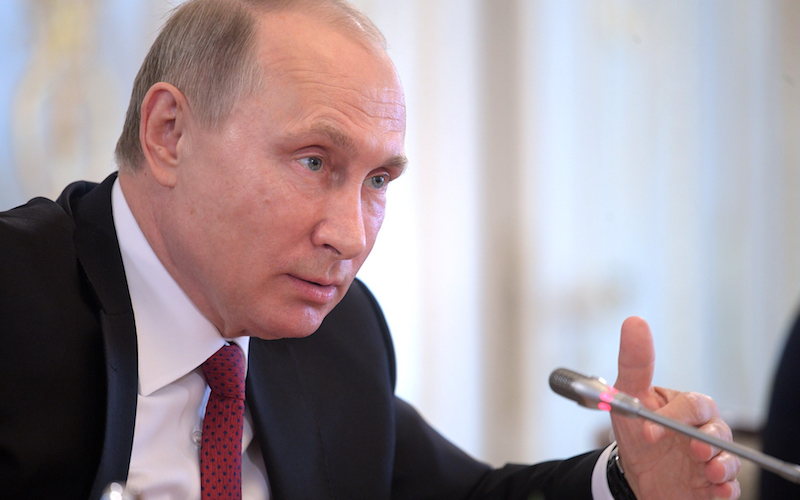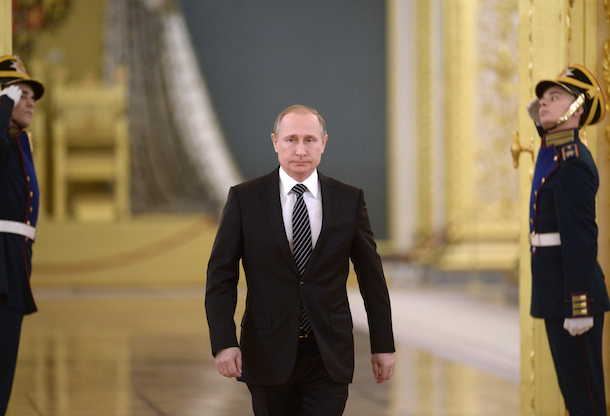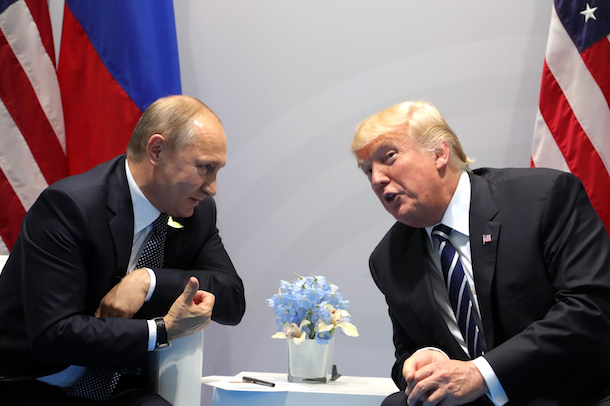
Twenty-first Century Visage of Power: Vladimir Putin
The President of the United States hemorrhaged power immediately preceding my birth. Lyndon Johnson rose to the highest office in the wake of John F. Kennedy’s assassination, and then won election less than a year later, buoyed by the enduring grief of an incomprehensible tragedy. Johnson, eventually disgraced by the Vietnam War, refused a second term and retired to Texas. He left an open path for Richard Nixon to resurrect his political career. Too young to remember Nixon’s landslide reelection, I was just old enough to recollect Nixon’s resignation. Gerald Ford never won a presidential election and he served as an innocuous place holder between Tricky Dick and Jimmy Who? I hate to drop demeaning nicknames, but objective historical analysis indicates Nixon earned his moniker, and James Earl Carter did arise from relative political obscurity. Before I turned ten, four men held the Oval Office. As a child, I doubt I understood the intricacies of geopolitics, or speculated who might wield the most power. I don’t remember Johnson, but Nixon, Ford and Carter all struck me as weak, each in his unique way.
The claim to most powerful human largely depends on perception, and bias. Perception arises from a biased philosophical foundation: Experience tunes our perceptions creating a basis for future comparisons; without bias, perception is akin to reading a book without knowledge of its diction. Discriminating thought develops as we sort information that confirms or contradicts our bias in varying degrees. Higher order thinking requires a biased premise; so long as that bias remains amendable, critical analysis thrives. No definitive test exists to state unambiguously that any individual wields more power than others. That written, let me continue developing an argument rooted in bias, but capped in lucid analysis of current events.
The Benchmark
President Ronald Reagan took over at the end of my elementary school experience and left office during my second year in college. USA’s superpower competitor, the Soviet Union, suffered a rapid succession of leaders during the same span. Leonid Brezhnev died in office (1982) after nearly 20 years as General Secretary of Central Committee of the Communist Party. Yuri Andropov and Konstatin Chernenko headed the politburo for less than three years, combined — they both died in office, too. Less than two months into Reagan’s second term, in March 1985, Mikhail Gorbachov took over the Soviet Union’s paramount bureaucracy and steered the “evil empire” into the sunset over the next six years.
Soviet leaders never seemed like singularly powerful individuals. The highest political office in the Soviet Union was the General Secretary. When I think of Soviet power, I see television images of several stoic, elderly men as they waved at the proletariat from a concrete balcony. They overlooked a Red Square parade of missiles, tanks and goose-stepping soldiery. A preponderance of grey buildings and surfaces with red banners and lacing trimmed the background. Soviet power was palpable, but disperse. The General Secretary served as a focal point, but he didn’t wield the same degree of executive freedom as a US president.
The default assumption that the US president is the most powerful person arose sometime during the Reagan administration, I suspect. George H.W. Bush, Bill Clinton, George W. Bush and Barrack Obama all managed to maintain the perception of humanity’s most powerful. This probably had more to do with the dearth of viable ideological foes than the dynamic leadership of any of these men. Reagan’s successors faced no challenge from a competing superpower. To maintain the most-powerful-mystique, they simply needed to avoid major mistakes. H.W. Bush and Clinton spent most of their power fending off domestic partisan assaults while blotting low grade authoritarians in strategic regions. W. Bush over-reacted to terrorism, at first, but resumed a more careful course by the end of his second term. Obama mostly reserved power and hoped to pass the levers to another capable hand at the end of his term.
Nadir
Many agree: Trump does not wear well the mantle of most powerful person. Perhaps Trump executes clear planning and decision making, in private, but he projects — perhaps Tweets is a more accurate verb — a disordered personality. Some of the USA’s traditional allies are searching for new strategies in global schemes. A significant portion of America remains eager to remove Trump from office. Whether you love or hate Trump, he’s under investigation for treason. Exoneration will take months; impeachment and removal, years. Trump’s fate remains murky, but he’ll certainly struggle to wield power commensurate with his predecessors.
So far, excluding Trump’s self-incriminating behavior, scant evidence exists of Trump-Putin collusion during 2016. The media calls attention to every bit of information indicative of Trump’s interaction with a hostile foreign government. Trump and his surrogates communicated with a mysterious array of Russian envoys, but that doesn’t prove Trump committed high crimes. Remember: Nixon resigned because the tapes recorded him obstructing justice; it was nearly impossible to interpret his comments any other way. Without those tapes, Nixon most likely would have served a full second term.
The surreal drama in the White House amidst the backdrop of metastasizing Islamic terrorism obfuscates the true geopolitical surprise of the twenty-first century: Vladimir Putin’s rise. I’ll stop short of labeling Putin the most powerful person, but he’s deployed some deft maneuvers since he emerged from the middling ranks of the secret police in a decaying empire. Like most people, I know little about Putin. After Trump’s deference to Putin at the G-20 meeting in Hamburg, I decided to research Putin’s biography.
The aspiring spy master
There aren’t many books about Putin. The New Tsar by Steven Lee Myers came out in 2015. Masha Gessen published The Man without a Face in 2012. A slapdash biography rushed into Russian bookstores, near the end of 1999, prior to Putin’s first presidential run. The Invention of Russia by Arkady Ostrovsky (2015) provides a detailed account of the Soviet Union’s transition to Putin’s Russia.
Young Putin’s identity formed after reading The Shield and the Sword, a novel about a Soviet spy. He says he was 12 (1964–1965) when he first read the best-seller. A popular miniseries based on the book aired on Soviet television when he was 15. Near the end of his secondary school years, Putin volunteered for the KGB. Rejected, and told the KGB typically selects its members, Putin probed on how to make himself an attractive candidate. They told him to distinguish himself in law school or the military.

Putin applied to Leningrad State University, one of the Soviet Union’s most competitive law schools. He demonstrated mediocre scholarship in secondary school and the odds favored failure to gain admission. Luckily for Putin, rigorous examinations determined fitness for success. His lackluster academic record didn’t prevent his admission. He got in.
Putin maintained an aloof disposition, earned good grades, and practiced judo. Despairing he might not capture the KGB’s attention, Putin’s dream came true during the last year of university. One day, a mysterious caller requested a meeting with Putin to discuss a “future job assignment.”
The letters K.G.B. conjure images of clandestine service in foreign countries with agents sporting false identities and tackling perilous assignments in the midst of sworn enemies. It’s important to distinguish espionage from secret policing. Putin apparently spent most of his early years in the KGB running counter intelligence operations in his hometown. Putin’s friends and acquaintances knew he worked in the KGB. Apparently, Putin policed more than he spied.
Let’s digress and ponder the most fundamental definition of a secret. It’s an obscured truth. We can assume that any secret is true. If it weren’t true, why hide it? The ability to keep secrets follows an evolutionary continuum. At first, people simply conceal the truth. More evolved secrets employ aggressive techniques — willful distortions. Ultimately, secrets gain traction: lies manifest; discernment of truth eludes; secrets thrive in plain sight.
Putin’s life and career preceding his rise to Prime Minister is the antithesis of the classic perception of democratic public service. He largely concealed his labors as an officer in one of history’s most effective secret police organizations. Details released about Putin are part of a carefully crafted image he allows the world to see. It’s impossible to say anything, in certitude, about a man who worked to uncover and manipulate truth most of his life.
A mythical life
Putin lived a legendary childhood. Born in 1952, in the wake of the Nazi siege of Leningrad, near the end of Stalin’s reign, he grew up in a harsh environment according to most standards. Putin’s father (also Vladimir), maimed during battle early in the war, convalesced with his wife, Maria, at their home in Leningrad for most of the siege. Encircled and shelled by Nazis for 900 days, Maria neared starvation as the siege lifted. The Putins lost one son before the war and another during the siege. They survived the war childless, but they had each other and their domicile remained intact. This is an unfortunate story for most people, but amidst the persistent horrors of post siege Leningrad, the Putins benefited from the best of luck.
Their fortune continued: Forty-one year old Maria, gave birth to Vladimir eight years after the end of the siege. Since no one beyond Putin’s parents remember him before he started school, rumors linger that they adopted him.
Putin grew up in communal privation. Gessen wrote:
“The Putins’ apartment did not have a proper kitchen, so a single gas stove and sink were stationed in the narrow hallway one entered from the stairwell. Three families used the four-burner stove to prepare their meals. A makeshift but permanent toilet had been constructed by annexing part of the stairwell. The small space was unheated. To bathe, the residents would heat water on the gas stove and then wash themselves while perched over the toilet…”
But, they lived well, relatively speaking.
“The Putins had the largest room in the flat: around twenty square meters, or roughly twelve feet by fifteen. By standards of the time, this was an almost palatial abode for a family of three. Almost incredibly, the Putins also had a television set, a telephone, and a dacha, a cabin outside the city.”
And, in a sense, Putin’s parents spoiled him.
“The elder Vladimir Putin worked as a skilled laborer at a train car factory; Maria took backbreaking unskilled jobs that allowed her to spend time with her son…But if one examines the fine shades of postwar Soviet poverty, the Putins emerge as practically rich. Given their unceasing doting on their son, this sometimes produced noteworthy results, such as a first-grader Vladimir’s sporting a wristwatch, a rare, expensive, and prestigious accessory for any age group in that time and place.”
Putin’s early education was mediocre at best, he never projected the image of a studious lad. Instead,
“…he placed great emphasis on portraying himself as a thug, and in this he has had the complete cooperation of his childhood friends. By far the largest amount of biographical information available about him…concerns the many fistfights of his childhood and youth.”

Putin’s precise tasks as a KGB officer elude discovery. Secret police officers avoid compiling finely described accomplishments in bullet form. It seems Putin’s daily work was best described as mundane and futile, as opposed to exciting and critical. Gessen wrote:
“In the middle to late 1970’s, Putin joined the KG when it was undergoing a phase of extreme bloating. Its growing number of directorates and departments were producing mountains of information that had no clear purpose, application, or meaning. An entire army … spent their lives compiling newspaper clippings, transcripts of taped telephone conversations, reports of people followed and trivia learned, and all of this made its way to the top of the KGB pyramid…largely unprocessed and virtually unanalyzed.”
During this period, between Vietnam and Afghanistan, the KGB focused inward, on dissidents. Putin pushed papers, endured successive training programs, and suffered tedious assignments lacking import. He got a chance to transcend secret police work in 1984. The KGB sent him to spy school in Moscow. Instructors noticed in him a “lowered sense of danger.” This characteristic, and possibly a reputation for getting into physical alterations while off duty, may have kept him from working in espionage behind enemy lines. The KGB sent Putin to Dresden, East Germany — a Soviet bloc country.
The KGB maintained a tiny presence in Dresden that paled in comparison to operations in Berlin, but Putin’s tasks came closer to the work of a spy. Myers wrote:
“He tracked businessmen or other foreigners passing through…focused his recruiting effort on students…rising through the ranks of industry and government…People once aided the Soviet Union out of ideological conviction, but now they betrayed their nations for money…”
Putin rose in rank and served as senior assistant to Dresden’s KGB director. Ultimately, his work reverted to enforcement within the organization, and away from spying on foreigners. Putin complained, “Nobody at Moscow center was reading our reports.” Apparently, internal affairs carried more recognition and reward than espionage in the waning days of Soviet domination over East Germany.
Perhaps Putin’s most notable accomplishment as a KGB officer came when he diverted a euphoric crowd hoping to sack Dresden’s KGB office in 1989 as Soviet control over East Germany collapsed. He told the mob he instructed his soldiers to fire on trespassers. Putin bluffed. The group dispersed. This allowed the staff to burn documents, uninterrupted. Putin’s most consequential action as a KGB officer entailed the destruction of intelligence that Moscow never read.
Putin and his family moved back to Leningrad in 1990. He took an administrative job at Leningrad State University and resigned from the KGB — there’s no official record of his resignation. Then, he worked for the first elected mayor of St. Petersburg (formerly known as Leningrad). By 1994, Putin developed a favorable reputation and served as the mayor’s first deputy. In 1996, he moved to an administrative job in the Kremlin. Boris Yeltsin promoted Putin to director of the FSB (the KGB’s successor) in 1998. Searching for an heir apparent, Yeltsin anointed Putin prime minister in 1999. Yeltsin resigned on December 31, 1999, and left his virtually unknown prime minister at the helm of the world’s largest nuclear arsenal; the election moved forward three months; Chechen conflict reignited; terrorists bombed buildings across the heartland; Putin promised to “rub them out”; Russians elected a fresh, sober, angular visage to replace Yeltsin’s tired, round, apparently drunken face. The Soviet Union’s collapse may have been a “major geopolitical disaster,” but also, it rocketed a seemingly ordinary KGB bureaucrat from obscurity to the pinnacle of power.
Nebulous Horizon
How do we identify definitive characteristics in a man who eluded publicity while incrementing power over several decades, but then exponentiated his technique once he gained proximity to the highest office? As the Cold War ended, Putin segued into the public eye and stealthily seized the global stage while most of his country, and the world, feared the rising tide of Islamic extremism. Putin’s reign as prime minister, then president, then prime minister, then president… spans four US administrations: Clinton, W. Bush, Obama and Trump. Russians can serve two consecutive presidential terms, and parliament extended the term from four to six years in 2008. Assuming Putin seeks reelection, in 2018, his executive power might endure until 2024. He could rule across the breadth of five or six (seven?) US presidents. Arguably, Putin entered his prime when USA elected Trump: Intelligence indicates Russian hackers successfully manipulated America’s most sacred institution. Vladimir Putin turns 65 in October. He’s popular in Russia, visibly healthy, and a reputed billionaire in an era of rapidly advancing medicine.

